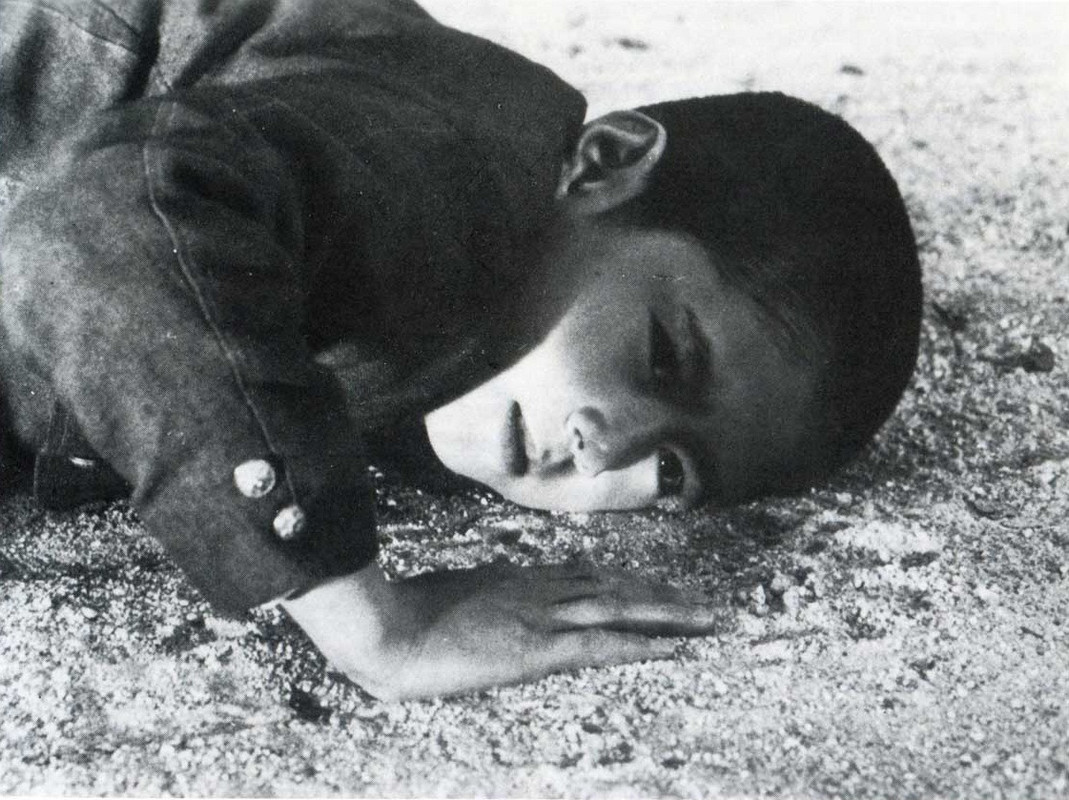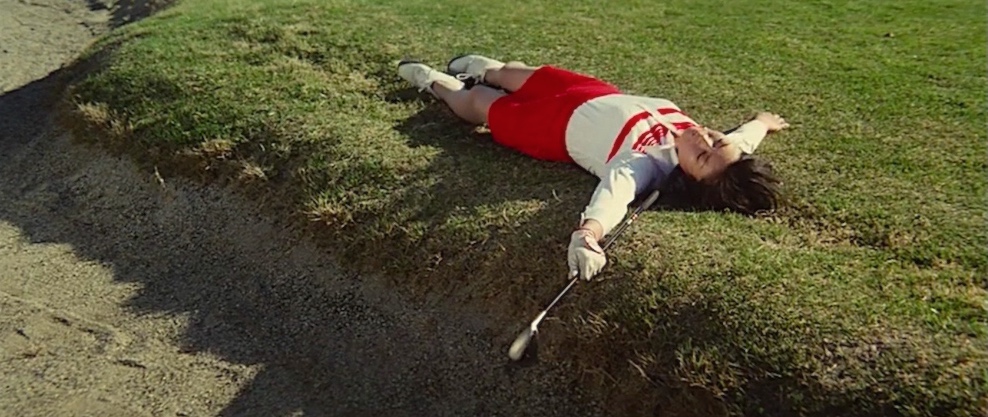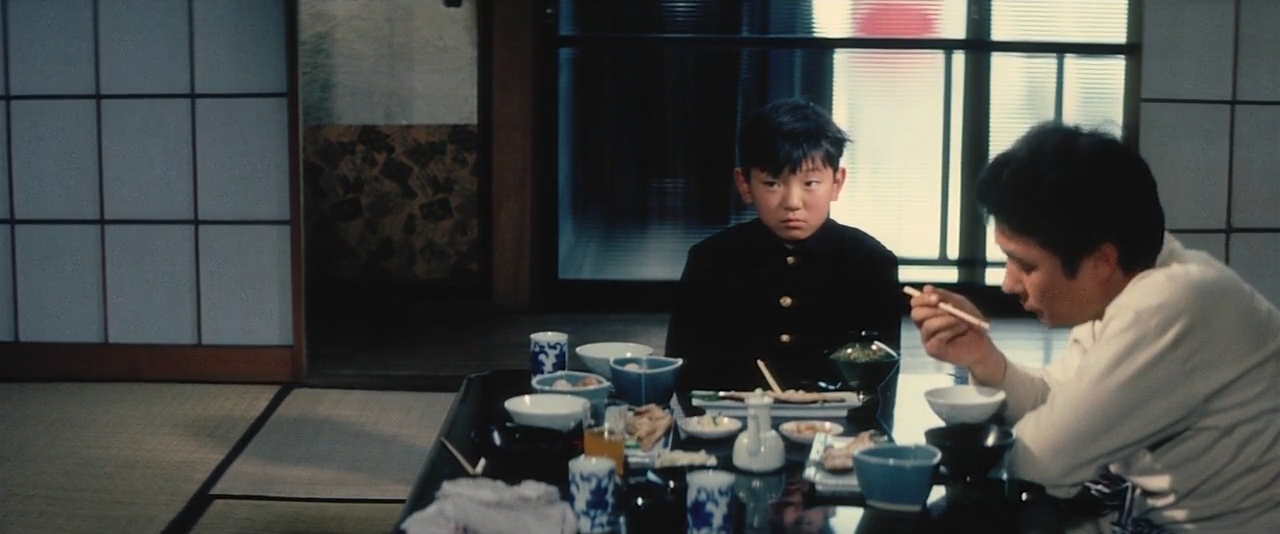儀式 [Gishiki / The Ceremony] (Nagisa Ōshima, 1971)
Jan
1

A boy in school uniform has his ear pressed against the ground. DP: Tōichirō Narushima.
ATG
鬼の詩 [Oni no uta / Song of the Devil] (Tetsutaro Murano, 1975)
Apr
29
Jerry Seinfeld – 1954

Keima Kyo entertaining his audience by hanging numerous clay pipes from his face. DP: Yasuhiro Yoshioka.
A comedian, or set in Brooklyn or NYC, for Jerry Seinfeld's birthday (1954).
Rakugo (落語, litt. “story with a fall”), is a style of Japanese comedy performed while seated. Armed with a few props, the rakugoka recites a comical monologue using pitch and gestures.
A dramatic retelling of the life of rakugoka Katsura Beikyo II. Keima Kyo, a talented rakugoka, is offered apprenticeship from an older successful performer, but refuses. Young and arrogant, he decides to take over the other man's act instead.
悲愁物語 [Hishu monogatari / A Tale of Sorrow and Sadness] (Seijun Suzuki, 1977)
Apr
13
1997 Masters Tournament

Reiko, looking fabulous, dropped down next to a sand-filled bunker. DP: Masaru Mori.
Golf (or a tiger) in honour of Tiger Woods' 1997 Masters Tournament victory.
Reiko (Yoko Shiraki), a professional model – is groomed into playing the circuit by the editor of a golfing fashion magazine. The rookie's unexpected success draws in all sorts of fans, including the obsessive.
– Dont raise your voice! I'll kill you if you make a sound. – Would you please? 聖母観音大菩薩 [Seibo Kannon daibosatsu / Eros Eterna] (Kōji Wakamatsu, 1977)
Mar
7
immortality

The yao bikuni (Eiko Matsuda) rises from the ocean. DP: Hideo Itō.
An immortal character on the date Highlander (1986) was released.
When a woman eats the flesh of a 人魚 (ningyo, litt. “human fish” but in Western context commenly translated as “mermaid”), she may become a 八百比丘尼 [yao bikuni], an 800 year* old Buddhist nun granted youth and longevity.
*The number 8 symbolises growth and prosperity. Larger numbers starting with 8 indicate that the amount is endless, comparable to saying “hundreds/thousands/millions of […]” in English. Therefore, 800 years can be understood as immortal.
”'I know how you feel,' Reiko says quietly. 'And I will follow you wherever you go.'”憂國 [Yūkoku / Patriotism or the Rite of Love and Death] (Yukio Mishima, 1966)
Feb
26
1936

Reiko (Yoshiko Tsuruoka) walking through her lover's blood, her kimono drenched. DP: Kimio Watanabe.
Covers February 26–28, 1936.
– intertitles
燃えつきた地図 [Moetsukita chizu / The Man Without a Map / The Ruined Map] (Hiroshi Teshigahara, 1968)
Feb
2

Shintarō Katsu and Etsuko Ichihara as the detective and the missing man's wife, their faces and gestures warped by a paned window. DP: Akira Uehara.
鴎よ、きらめく海を見たか めぐり逢い [Kamome-yo, kirameku umi o mitaka/meguri ai / Oh Seagull, Have You Seen the Sparkling Ocean? An Encounter] (Kenji Yoshida, 1975)
May
30
Pokkī

A young woman in a red-and-white striped sweater (Yōko Takahashi) leafs through fashion magazines strewn out before her on a grass-green carpeted floor while chewing a Pokkī. On a small stove close to her a fire truck red coffee pot. DP: Kōshirō Ōtsu.
少年 [Shōnen / Boy] (Nagisa Ōshima, 1969)
May
6

The boy in his school uniform (Bin Amatsu) at a table in a traditional Japanese room with his meal untouched. A man eats next to the kid who glances at someone or something offscreen. The table is set for three. DPs: Seizō Sengen & Yasuhiro Yoshioka.
少年 [Shōnen / Boy] (Nagisa Ōshima, 1969)
Dec
17
Freebie: National Insurance Awareness Day

The boy waiting next to a buzy road. DPs: Seizō Sengen & Yasuhiro Yoshioka.
Freebie: National Insurance Awareness Day (USA) redux.
A boy (Bin Amatsu), helps out his father and stepmother's insurance money scam by pretending to be injured in traffic.
儀式 [Gishiki / The Ceremony] (Nagisa Ōshima, 1971)
Nov
11
World Origami Day

A man kneeled in front of a Shintō altar. Ceremonial origami, known as origata or girei origami can be seen hanging from the altar. This is 幣帛 [heihaku], an offering made of cloth or paper. DP: Tōichirō Narushima.